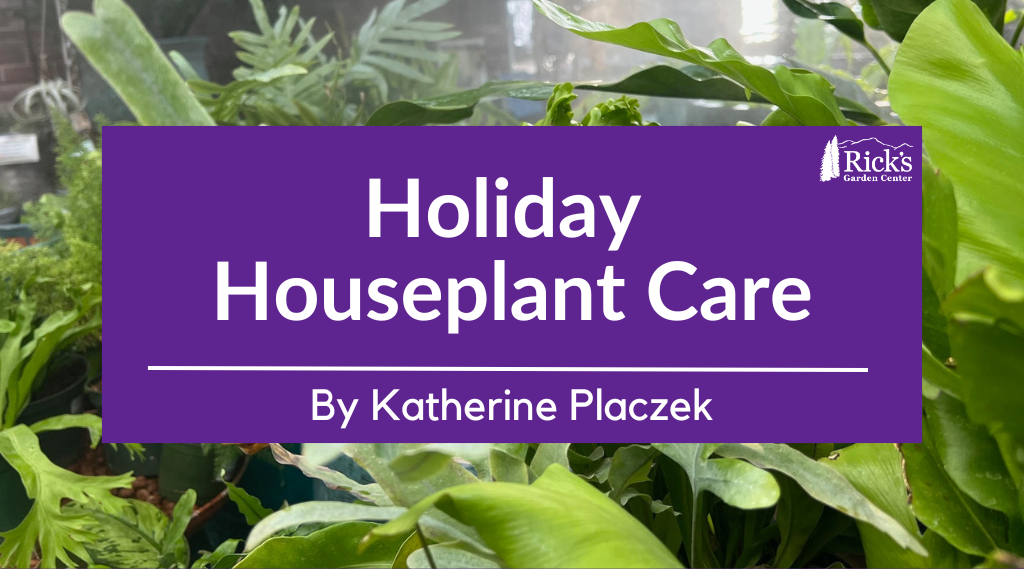Holiday Houseplant Care
So many of us travel around the holidays- sometimes traveling the whole stint of Christmas through the week of New Year’s. This stretch can be long for plants (and you- depending on who you are visiting and how long the trip is), without their regular TLC from you. Our easy-to-follow tips to ensure your plants look amazing after your holiday hiatus.
Moisture
All plants have different moisture needs. Some will need closer attention, and regular watering, even while you are gone. If this is the case for some of your plants, you can implement a self-watering system such as a plant watering globe, plant nanny, or drip irrigation system. A drip irrigation solution is as simple as filling a container of water, and then using a strip of yarn or other water-wicking material immersed in the water to have it “transport” water to the plant in need.
If you prefer, feel free to lean into your community. Ask a neighbor to water while you are gone. Ensure you show them exactly how you water, and how often, so they do not over or under water. Winter air in Colorado is dry. Some of your houseplants will benefit from added humidity. A humidifier on a timer or a DIY humidity tray are great solutions for when you travel. A humidity tray can be as simple as a ceramic drip tray filled with pebbles or clay balls/LECA. Fill the tray with water, and place your potted plant on top of this set-up. Anything that evaporates will immediately be absorbed by the plant.
Mulch
We typically think of mulching as a technique to utilize outdoors, but this technique can also be used indoors! Mulching can help retain moisture during short periods. Use fine-grade orchid bark as a top dress for houseplants that need extra care. Once you have mulched, regularly check that these plants are not retaining too much moisture.
Light
Winter can be a challenge for some houseplants, especially tropical houseplants native to the region around the equator. The equator experiences more consistent sun exposure year-round. You probably have noticed the increased darkness during the winter months in our region. Thus, some of your houseplants may be craving more light right now. Move any plants that need more light to a sunny window, or beneath a grow light on a timer. With temperatures dipping in the winter months, make sure you are aware that the window you place your plant by is transmitting those cold temperatures indoors. No house plant likes a cold draft!
Temperature
As alluded to in the above paragraph, temperature is key to a plant’s happiness! Winter brings new variables for plants. Cooler temperatures translated through windows can cause frost, so move plants that may be susceptible. We also have heaters running in the winter. If you have a plant directly over a vent or radiator, you may see leaf drop or “burnt” leaves. Move any plants that could be affected. Some of these signs will show up only after you have spent time away, so it is helpful to address these risks ahead of time.
Maintenance
While some of us may leave house plant maintenance at the bottom of our to-do list, it is important to address it before you leave for an extended time. Many problems that are riding under the surface can rear their head if left unchecked. This includes any existing pest concerns. Preventative measures can include wiping houseplants down with diluted neem oil and a rag. Neem works as a leaf shine, micro-nutrient, and pest repellant. Other maintenance may include trimming any dead or languishing leaves and stems, so pests cannot get a foothold while you are gone. Trimming in this fashion, also allows plants to conserve energy and focus on being healthy, instead of trying to recuperate in your absence.
Fertilizing
Fertilizing houseplants in the winter is frowned upon since winter is a season of “hibernation” and not growth for houseplants. Winter can be a stressful period for some species due to cold, drier conditions, and reduced light. Fertilizing can present additional stress. Do not fertilize ahead of your travels, where you are not able to observe any drastic changes or your plants’ calls for help!
Now, what if you were unable to follow these recommendations, and you return to a home of sad-looking plants? We will be covering houseplant-rescuing tips next month!

Back to Blog